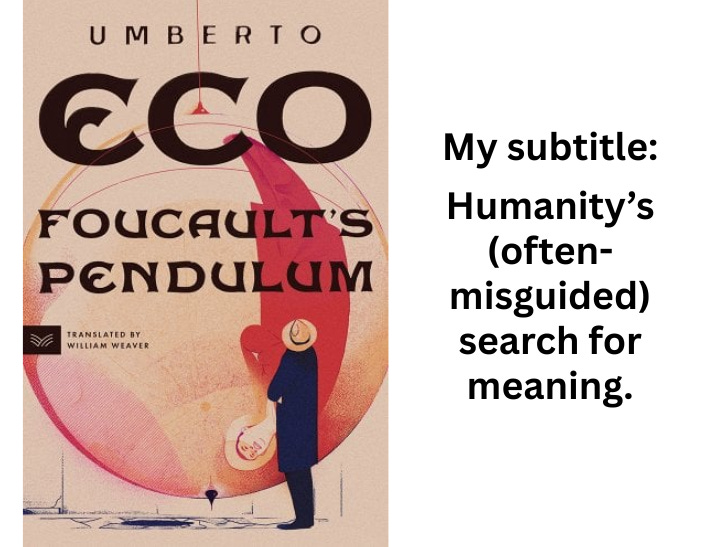Finding meaning in life, as a general principle, usually beats nihilism.
Just ask Holocaust survivor Victor Frankl, who sold about a bazilliion copies of his book, “Man’s Search for Meaning.”
But this general principle comes with a big ol’ hunking caveat:
It all depends on where you find meaning.
I stewed on this concern recently while reading the Italian author Humberto Eco’s classic novel “Foucault’s Pendulum.”
For the record, I don’t necessarily recommend you read this book, unless you have a Ph.d. in Western religious history, in which case this would rank as your favorite novel of all-time, bar none. Eco shows off an encyclopedic knowledge of every esoteric or mystical movement in European history, going back at least 2,000 years.
For the rest of you, I’ll save you some trouble by summarizing the book thusly:
The three Abrahamic religions – Judaism, Christianity and Islam (in chronological order) – sought to meet the masses’ need for meaning in life. These religions offer a moral code, an origin story (see Genesis 1) and a messianic promise, an era when all will be revealed.
Eco would say to the founders of these three religions: Nice try.
The reality is, people who needed to believe in “a plan” – and in a secret that, once possessed, would imbue adherents with God-like powers – have created all manner of religious offshoots and conspiracy theories.
In Judaism, we have the Chasids, who created the elaborate theology of Kabbalah. In Christianity, you have the Mormons and the Jesuits, not to mention the Freemasons and the Scottish Rite lodges.
Eco, in the 600–plus pages of “Foucault’s Pendulum,” identifies about a thousand other movements and theories, all of which you can find in Wikipedia.
The problem is, many of these meaning-providing movements lead people astray, or even into violence. For instance, I’m sure a lot of The Alignment’s readers are old enough to remember the Rev. Jim Jones and his People’s Temple.
My fellow Jews understand this all too well. Eco, for example, refers to the Protocols of the Elders of Zion, the (originally) Russian book asserting that Jews had covertly amassed inordinate power and were planning to take over the world.
Never mind that the assertions were unfounded and ridiculous. The book fanned the flames of deadly anti-Semitism in Russia and even in Germany.
More recently, and here in the U.S., we saw the Jan. 6, 2021, attack on the U.S. Capitol, in which a violent mob believed conspirators not only had the ability but succeeded in stealing an election.
You may be asking at this point, what does any of this have to do with you? You don’t belong to a cult. You’re not antisemitic. And you believe Joe Biden won the 2020 election, fair and square.
But you do, I guarantee it, believe in several stories, which are a double-edged sword.
As homo sapiens, our brains are meaning-making machines. They filter the chaos around us and ascribe attributes and even purpose to phenomena. For instance, your sense of self, your identity, is a story, albeit one with some factual elements (hopefully).
Another example is money. In reality, money has no inherent value. We left The Gold Standard decades ago. But collectively, we all choose to believe that a specific amount of money has a specific value, which enables us to exchange goods and services.
Not all commonly believed stories are so benign, however.
For example, much to the chagrin of The Alignment, most people believe some version of the story that animals are vastly inferior to humans and can thus be confined, exploited and even killed for food. This is a story, not science. Ethical vegans woke up from this nightmare and realized the truth: We are animals ourselves and our fellow animals are suffering terribly in factory farms and slaughterhouses.
I have no reason to believe that Umberto Eco was vegan. But I do know that, in Foucault’s Pendulum, he is practically begging us to closely examine the stories we tell ourselves. It’s not that we need to discard all of them; I don’t know if that’s even possible.
But the world would be well-served if we exercised some serious discernment and purged any beliefs that are causing unnecessary harm to ourselves or to others.



